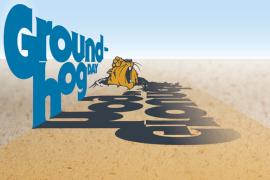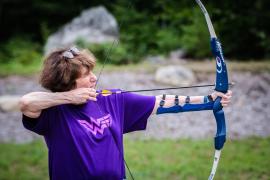The staff at Kamp Kessa, an adventure education and treatment program utilizing horses and the wilderness for youth who are considered at-risk and who have special needs in Frankfort, Kentucky, are often asked, “Why do you use horses?” and “Why do you emphasize youth being in natural settings?” Often the questioner will consider young people having such access as a privilege that should be either awarded or withdrawn according to the perceived appropriateness of their recent behaviors. After all isn’t getting to ride a horse a privilege that is a great “reinforcer” that should be rightfully earned? Here’s the short version of our answer:
Studies have shown that increasing numbers of American children and youth are at risk of serious impediments to growing into healthy adults. Health issues, alcohol, drugs, inadequate networks of support and more are all challenges to their health and welfare. To appreciate the truth of these impediments does not require that statistics about drugs, violence, and teenage pregnancy be rattled off. All that is really needed is for concerned adults to watch how many children learn at a tender age not to be tender — and how many young people in America today have come to assume that being successful means looking out for “number one.” Structured mentoring of youth — in a wilderness challenge environment — has proven to significantly impact in positive ways some if not all of these struggles. Educators and therapists have been using wilderness challenges in therapeutic programs for troubled youth for decades.
The Wellness of Nature
Why has the process of building relationships with animals and the wilderness been demonstrated to be so consistently therapeutic for young people? Consider it this way, the most common characteristic of children and youth who are at risk or who have special needs in America today is that they have troubled connections with troubled systems (e.g., troubled schools, troubled families, troubled and overwhelmed mental health and juvenile justice systems, etc.). When children and youth are given the opportunity to connect into the wellness of nature, whether that takes the form of a meaningful relationship with a horse or a connection with the majesty of a hardwood forest (or endless other possibilities), they become involved in a system that is already well. Stated another way, the nature of wellness can readily be discovered and connected with, within the wellness inherent in the natural world. We can all find sources of strength and renewal of spirit in the earth and the cycles of nature. The processes of birth, growth, death, decay, and regeneration that occur in the seasons, the plants and animals, and the soil, are models for our growth and for human community.
Supporting Natural Growth and Healing
The question concerning children and youth at risk is not whether we want to help them grow and flourish as human beings in ways that honor their natures — of course we do. The real question is how do we propose to accomplish that? Our answer to that question is relatively simple and straightforward: Find ways to connect young people into the wellness of the natural world while simultaneously identifying and explicitly teaching the healthy values and life-affirming principles that are to be readily found there. For instance, a meaningful relationship with a horse by the very nature of the relationship “naturally” teaches responsibility (through the need for meeting the basic needs of the horse); caring (through the love and caring that develops between horse and rider); respect (through the inevitable acknowledgment that the horse has a mind of his or her own); and honesty (since we can’t long portray ourselves as better than we are in our abilities and skills before our personal safety becomes an issue). It is no accident that the values found and naturally acquired through a meaningful connection with a horse also reflect the values mindfully and traditionally embraced by the Boy Scouts, Girl Scouts of the USA, 4-H, and the YMCA/YWCA. As traditions of Native American wisdom have long observed, the true nature of growth and healing can only be discovered and discerned by maintaining a meaningful connection with the natural world.
Valuing the Natural World
All educational, therapeutic, and vocational programs teach what is to be valued — whether or not they have adopted a specific program to that end. The rules (and who makes them), the programs, the culture, and climate — all send messages about what matters (even if they are sent in unintentional ways and received unconsciously). There is no such thing as a value-free system. At Kamp Kessa, to support our youth in the healthiest sense means providing for them the opportunity to connect into the wellness of the natural world while focusing on teaching that clearly identifies and is explicitly designed to teach values related to personal, family, community, and earthly wellness. As the natural world so vividly teaches us, none of these are separate issues. Some call what we are doing character education, some call it adventure education, some call it outdoor experiential education, we call it using horses and the wilderness to teach the power of big ideas and the truth of larger purposes. This is the essence of why we use horses, and why we have made it our life’s work to provide at-risk and special needs youth the opportunity to develop therapeutic relationships with horses in natural settings. To us, what we are attempting to do is certainly not about providing “reinforcement for appropriate behaviors,” or alternative recreational opportunities. We are attempting to provide to children and youth who are surrounded by an increasingly industrialized and chaotic world, access to nature’s path to personal re-creation.
Thecla Helmbrecht Howard, Ph.D., and Anthony H. Howard, M.S., are cofounders of Sheltered Risks, Inc., Shelby County, Kentucky, a nonprofit resident camp serving at-risk populations. Thecla has twenty-five plus years of experience working with youth and a doctorate degree in educational leadership.
Anthony has served youth for over twenty years in a variety of settings, receiving the prestigious Kentucky Superintendent of the Year award recently. He holds a master’s plus 30 Rank 1 certification in Kentucky. Anthony and Thecla are coauthoring Why Horses in the Wilderness, Education, and Treatment from the Heart.
Originally published in the 2004 March/April issue of Camping Magazine.



